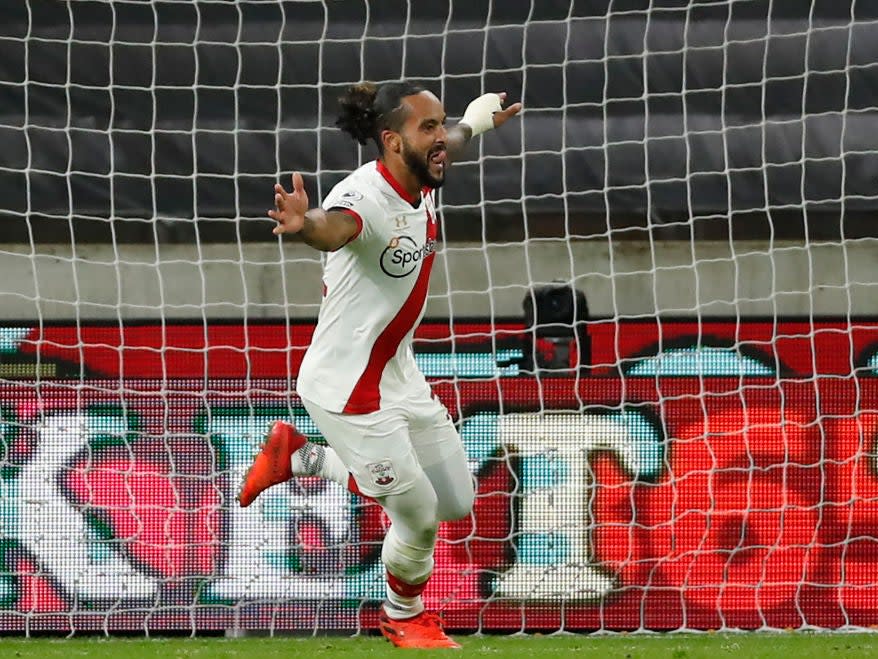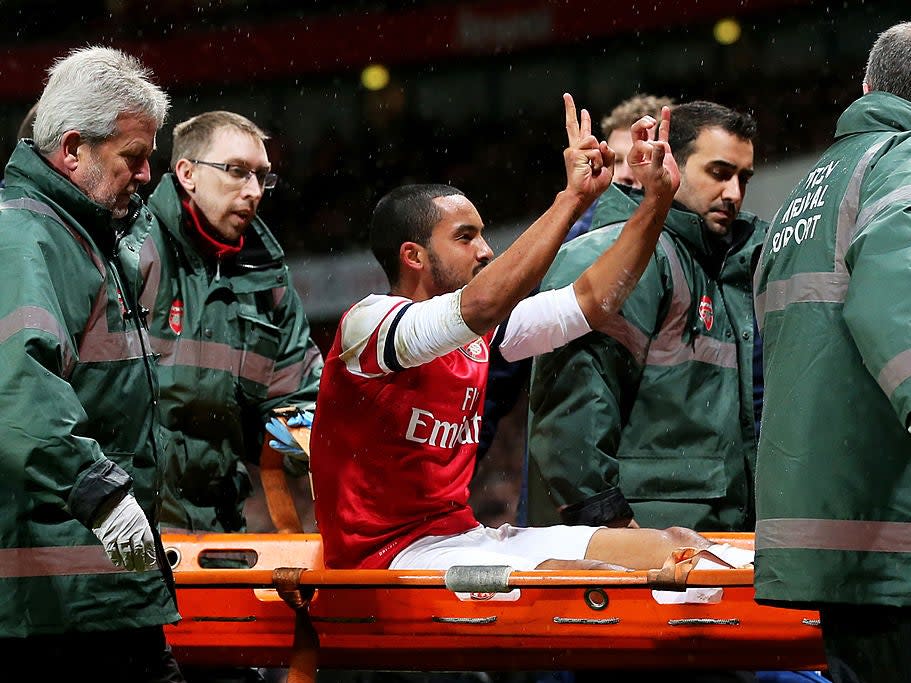‘I feel like a kid again’: The enduring smile of Theo Walcott

Perhaps the greatest strength of Theo Walcott’s glittering and frustrating career is that, no matter what football has thrown in his direction, he has never allowed it to change him. When he scored his first goal for Southampton way back in 2006, bursting through with unnatural speed and wide-eyed relish, it felt as though even the weight of the world couldn’t slow him down. In the end, even if the intervening years did eventually break his stride, nothing can claim to have withered Walcott’s defining characteristic; the endless grin that accompanied his first goal and beamed just the same as he scored for Southampton again this week.
It is tempting to see Walcott’s career in before-and-after pictures; the endearing teenager for whom anything was possible and the adult who never quite grew into that stature. Plucked from his boyhood club by Arsenal and incomprehensibly called up to the 2006 World Cup squad, from thereon the expectation was practically insurmountable, a bar that would always be raised no matter how high he reached. For such a young player, the gravity of that glare can even be crushing. And yet, Walcott was almost blissfully oblivious. He strode around Baden-Baden in flip-flops with innocent disbelief, savouring and recording every moment in a video diary on his handheld camera. His scrutinised presence didn’t cause him to hide, even if Steven Gerrard later wrote that Walcott had “no right” to be there, but in fact Walcott had already realised there wasn’t a moment he could afford to miss.
With no absence of cruel irony, that was, after all, the truth. Despite his scintillating hat-trick against Croatia in 2008 – the youngest of any player in England’s history – Walcott was dropped by Fabio Capello two years later and never went on to play at a World Cup. At Arsenal, in the words of Arsene Wenger, he became a man but “not a monster”, with moments of brilliance alleviating bitter exasperation.
READ MORE: Playing for Southampton ‘means something’ to Walcott
Perhaps, though, that was never really Walcott’s fault at all. He could never escape the image that others had dreamt of him: his speed touted like a prize asset in an arms race; his inheritance of Thierry Henry’s No 14 shirt promoting a vision of relentless goalscoring. Hysteria rose beyond reality and was survived by moments of genuine wonder. But those glimpses of the unstoppable force Walcott might be were all too often overshadowed by a headless sprint or desultory final ball. That seemed to epitomise him, so tantalisingly close to the finish line but always with slightly too much ground to make up.

Theo Walcott celebrates scoring against Wolves
POOL/AFP via Getty ImagesWhen it became apparent that Walcott had approached something of a plateau – perhaps even as early as 21, when Capello fiercely lamented his tactical awareness – he was faced by an unusual intensity of criticism. Such can be football – and life’s – fickle and sadly vindictive nature that, having raised Walcott so high and with such hope, now there was a determination, a debt even, to tear him back down. And so when Walcott was still only 20, Chris Waddle claimed he had “no football brain”. At Arsenal, he became a convenient scapegoat during Arsene Wenger’s decline, his every mistake met with heaving sighs or faint jeers. Often, it felt as though his good nature was preyed upon as a weakness.
For any player, that type of fatigue is draining and many would not have been able to withstand it. Yet while Walcott endured it on something of a washing machine cycle for the best part of a decade, he never allowed it to dilute his childlike love of football. During the times when it might have been easier to crumble, like when he tore his cruciate ligament in the North London derby in 2014 - dashing his World Cup dreams again - Walcott remained smiling even while he was taken off the pitch on a stretcher. As Arsenal became consumed by a frothing backlash during his latter years at the club, he blocked out the dissent, not for the sake of stubbornness - he was certainly aware of the reprove - but so he could always maintain the sense of fun and freedom which football brought. “I haven't heard anything,” he said in 2017. “Criticism, I don't even bother looking at.”

Theo Walcott is taken off on a stretcher during the North London derby in 2014
Getty ImagesWalcott’s homecoming goal against Wolves - the 125th of his career - meant he has now scored in the last 14 successive Premier League seasons. To a large number, he will always be viewed through that prism of lost potential, regardless of what he has gone on to achieve. Instead, maybe we should look at Walcott through the lens he sees himself, that same wide-eyed one that fronted his video camera in 2006. It may not be quite so naive anymore, but the sense of sheer delight has never vanished. Perhaps, if it had not burned so brightly, the attrition and spite would have eventually worn him down. Instead, Walcott’s enduring smile has separated him from what might have become, not what he could have been. “I’m 31 but I feel like a kid again,” he said with a laugh. Better yet, maybe he never truly stopped feeling that way at all.
This weekend get a £10 free bet with Betfair, when you bet £10 on a Same Game Multi on the Premier League. Terms: Min £10 Same Game Multi bet on any EPL match this Fri - Sun. Free bet valid for 72 hours, awarded at bet settlement. Excludes cashed out bets. T&Cs apply.

 Yahoo Finance
Yahoo Finance 